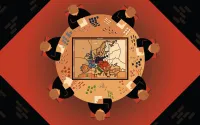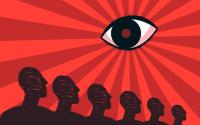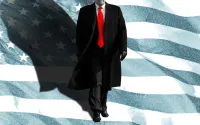10 September 2007Patricia Cohen
Festivalgoers in Venice and Toronto who attended the premieres this weekend of “The Shock Doctrine,” a six-minute film written by the author Naomi Klein and the director Alfonso Cuarón, saw images of electroshock treatments from the 1950s, animated pages from a C.I.A. torture manual and footage of the 9/11 attacks and the 2004 tsunami. The brief movie encapsulates the thesis of a new book of the same title by Ms. Klein: That unconstrained free-market policies go hand in hand with undemocratic political policies.
While Mr. Cuarón’s political passions can be glimpsed in his dystopian 2006 thriller “Children of Men” (Ms. Klein is a commentator on the DVD), most Hollywood directors don’t end up making promotional videos for thick texts about global economics. “When she asked if I was interested in doing a trailer,” he said from Italy, “my answer was, ‘I’m sorry, I can’t do it.’ ”
Then Mr. Cuarón read the book: “I had to call her back. I said, “Naomi, please don’t drop this. You — we — have to do this.” He drafted his son Jonás to direct. (The film can be seen on her Web site, naomiklein.org.)
While perhaps not quite as powerful a marketing tool as having Victoria Beckham photographed reading “Skinny Bitch,” it’s not bad. Yet this sort of fortuitous event seems regularly to happen to the 37-year-old Ms. Klein.
Her book “No Logo” was at the printer just as young demonstrators rioted in Seattle in 1999 to protest the World Trade Organization meeting there. Overnight Ms. Klein, with her dark eyebrows and youthful intensity, became both a spokeswoman for and analyst of the anti-globalization movement that caught fire around the world. That book sold more than 1 million copies worldwide.
“The Take,” her 2004 documentary about a workers’ cooperative in Argentina produced with her husband, Avi Lewis, was being filmed when Carlos Saúl Menem, the former president who had presided over that county’s economic collapse, unsuccessfully attempted a dramatic comeback. Argentina was where Ms. Klein began to formulate her argument in “The Shock Doctrine: The Rise of Disaster Capitalism,” being released in the United States on Sept. 18.
“I felt it emotionally before I understood it factually,” Ms. Klein said during a recent visit to New York from her home in Canada. It was “blindingly obvious” to everyone there, she said, that there was a “connection between violence, the military coup and these economic policies that people didn’t want.”
In her book she argues that the shock therapy prescribed by Western economists during the last 30 years could not have been imposed without political shock therapy, namely brutal repression and a suspension of democratic rights. Western countries, along with the International Monetary Fund and the World Bank, essentially exploited disasters — hyperinflation, the tsunami, the war in Iraq — to force through radical changes like privatization, deregulation and severe cuts in social spending. These policies, imposed by foreign and American disciples of the laissez-faire economist Milton Friedman, she maintains, caused grinding poverty and hardship for millions while often permitting multinationals to buy up a country’s most valuable assets for going-out-of-business prices.
Even the shock of 9/11, she said in an interview, was “harnessed by leaders to end the discussion of global justice.”
Nor are democratic governments exempt. Solidarity in Poland in 1989, she writes, was forced to reverse positions on which it was elected — i.e., backing worker cooperatives — and impose a state of emergency after being strong-armed by the I.M.F. and other lenders that refused to extend aid and credit unless Poland adopted a radical free-market program.
“We did not lose the battle of ideas,” Ms. Klein likes to say. Alternatives to the free market were “crushed by army tanks and think tanks.”
Her unconventional take is sure to stir criticism. Yet holding politically unpopular views is something of a family tradition for Ms. Klein. Her parents went to Canada, where she was born in 1970, so her father could avoid the Vietnam draft. Her family later moved back to the United States but returned to Canada when her father, a doctor, decided he wanted to work in a public health system. Her mother belonged to a feminist filmmaking collective.
Ms. Klein wrote for the campus newspaper while at the University of Toronto in the mid-1990s, but was dispirited by the left’s seeming malaise. There was a “smallness to our politics,” she said of the preoccupation with race, gender and ethnicity. When she returned to school a few years later, she met a group of younger activists who were excitedly organizing around globalization.
As Ms. Klein talks about protests, one can see her enthusiasm about the power of mass mobilization. In her public speeches, like one she gave at the American Sociological Association conference this summer in Manhattan, she seems as interested in promoting activism as in promoting her book.
“We are missing movement power,” she complained. “Fixing the world’s problems has become an increasingly elite affair — a matter between C.E.O.’s and celebrities. It’s noblesse oblige on a large scale.”
That comment is a pointed jab at the globe-trotting economist Jeffrey D. Sachs, who has recently enlisted Bono in an ambitious campaign to end global poverty. In her book Ms. Klein partly blames Mr. Sachs for the disastrous results in Russia and wrenching deprivation in Poland and Bolivia, where he was an adviser.
“There’s a theme which I broadly agree with that the extreme free-market reform ideology of the 1980s and onward really got out of hand,” said Mr. Sachs, who is director of the Earth Institute at Columbia University. But “she didn’t really understand a lot of things that happened in the places I was involved.”
The zeal of the free-marketers is so great, Ms. Klein declares, that if a natural or financial disaster fails to materialize, economists and policy officials help precipitate one. In her book she quotes a speech delivered by the economist John Williamson in 1993: “One will have to ask whether it could conceivably make sense to think of deliberately provoking a crisis so as to remove the political logjam to reform.”
She points out that the International Monetary Fund’s own auditing arm criticized the fund’s approach after it forced Asian governments to accept shock therapy during the 1997-98 financial crisis. More than 24 million people across Asia lost their jobs.
The demands were “ill-advised” and “broader than seemed necessary,” Ms. Klein writes, citing the audit, which concluded that “crisis should not be used as an opportunity to seek a long agenda of reforms just because leverage is high, irrespective of how justifiable they may be on merits.”
Mr. Williamson, a senior fellow at the Peterson Institute for International Economics, has not read the book, but after a brief description said, “It doesn’t sound like she has a full appreciation of my position.”
Anders Aslund, also at the Peterson Institute and the author of a forthcoming book, “Russia’s Capitalist Revolution: Why Market Reform Succeeded and Democracy Failed,” labeled a description of Ms. Klein’s argument as “complete nonsense.”
“If you don’t do anything, you have the state managers take over,” he said, citing Uzbekistan and Belarus as places where halfway economic measures were tried and resulted in dictatorships. Political scientists are at fault, he said, because they haven’t “got a clue about how to build a democracy.”
Ms. Klein, who was heartily attacked for “No Logo,” is not unaccustomed to criticism. But she added that then, “I had a movement on my side.” This time, she said, “I think this will be a lot lonelier.”
http://www.nytimes.com/2007/09/10/books/10shock.html?_r=2&ref=books&oref=slogin&oref=slogin






